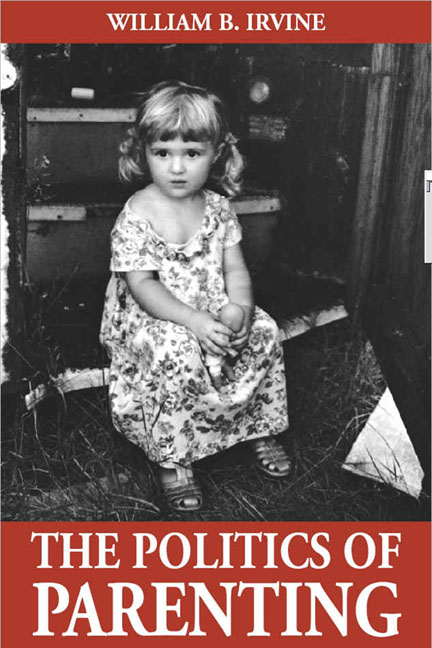“The Politics of Parenting takes an unflinching look at some taboo topics. From a re-animation of the long-dormant debate over eugenics to a renewed call for the licensing of parents, William Irvine challenges assumptions that underlie our policies. His positions are often provocative, but even his opponents will benefit from his analyses of these difficult social problems as well as his discussion of the proposed solutions to them.”
—Donald C. Hubin, Professor of Philosophy,The Ohio State University
Arguments Too Strong to Ignore
“Plenty of us will blanche at the suggestion to invoke the state…. But those who have doubts had better come up with other ideas, for Irvine’s arguments are too strong to ignore.… Anyone interested in children—and I hope we all are—can’t afford to ignore this book.”
—Jan Narveson, Professor of Philosophy, University of Waterloo
"Recommended"
—Choice, November 2003
America is a land of laissez-faire parenting. All who possess the biological ability to make a child are allowed to procreate. And having procreated, they are allowed to raise the child they brought into existence, with minimal interference from the government.
The Politics of Parenting examines the relationship between children, their parents, and the state by asking three questions: Who should be allowed to procreate? Who should be allowed to raise children? and, to what extent should the government regulate parental behavior?
The Politics of Parenting completes the task begun in Irvine’s Doing Right by Children, in which he examined the moral obligations of parenthood and argued that parents should not act as owners of their children, but as stewards who care for their children’s best interests. In this volume, he considers the extent to which the government should force parents to do right by their children.
CONTENTS
Prologue
Part One. Who Should Be Allowed to Procreate?
Chapter 1: A Brief History of Eugenics
Chapter 2: The Case Against Eugenics
Chapter 3: Designing Children
Chapter 4: Population Control
Chapter 5: The Population Implosion
Part Two. Who Should Be Allowed to Raise Children?
Chapter 6: Children without Parents
Chapter 7: Licensing Parents
Chapter 8: Adoption
Chapter 9: Contested Parental Rights
Part Three. How Should the Government Regulate
Parental Behavior?
Chapter 10: Regulating Parental Behavior
Chapter 11: Divorce
Epilogue
Notes
Sources
Index
WILLIAM B. IRVINE has written widely on issues of public policy and applied ethics. Dr. Irvine is Professor of Philosophy at Wright
State University in Dayton, Ohio.






